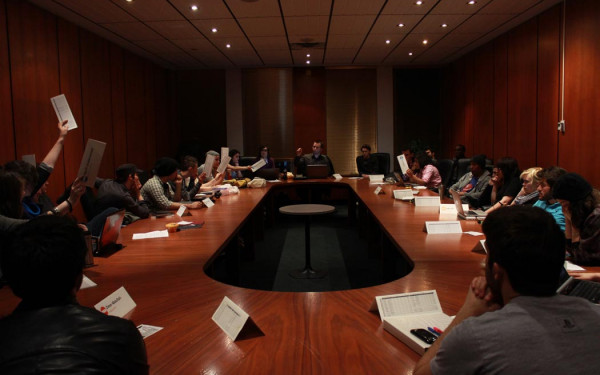The Bare Minimum
Voting on Minimum Agreement a Bad Idea
Sometimes a fail is a blessing in disguise.
That was the case on March 26, when a less-than-overwhelming amount of students turned out for a General Assembly on a wind-blown Reggie’s terrace. After over an hour of noses getting redder and feet getting number, the whole shebang was called off due to a lack of quorum.
While tensions ran high as accusations flew that the Concordia Student Union and the students who petitioned to hold the GA didn’t do enough mobilization, I’d argue that we dodged a bit of a bullet on this.
We all know where we stand on the strike at this point. So if the 450 students necessary for quorum had shown up, it’s fair to say that whether it was decided to continue the strike or not, the people there would have been making a decision with at least a modicum of knowledge about the issue.
But what worries me is that another part of the agenda was about something fairly obscure. I can’t help but feel that calling for a GA to vote on the CSU adopting a minimum agreement was an effort to push through an agenda point whose specifics are only really known to one side—those who support it. But let me back up a second here.
Do you know what the minimum agreement is? Because I’ll admit it, up until it was brought up at a CSU Council meeting back in January, I had no idea.
So just as a primer on this, it’s an agreement, signed by three out of the four student lobby groups in Quebec (the Association pour une solidarité syndicale étudiante, the Fédération étudiante collégiale du Québec, the Table de concertation étudiante du Québec), but not by the Fédération étudiante universitaire du Québec, the group to which the CSU belongs.
It comprises three elements: that all signees refuse to negotiate with the government without the other groups, that the organizations not make recommendations to their members on any negotiated agreements, and that all signees refuse to denounce any tactics used by other organizations or associations.
The CSU Council has so far voted not to accept the agreement twice. The first time was at the aforementioned meeting in January.
A few weeks ago, three students began circulating a petition calling for a GA to vote on the agreement. They were persuaded to set aside the petition, but Council agreed to revisit the issue, which they did on March 14.
At that vote, they elected not to sign on again. Another petition by three different students was started up that same week, collected the 250 signatures necessary to call a Special General Meeting, and here we are.
I’m not going to tell you whether adopting the minimum agreement at Concordia is right or wrong. I am going to say that I think a GA is the wrong forum for it.
It’s pretty clear that the people who show up for a vote are pro-strike. Add a motion for the minimum agreement, and without knowing the history or repercussions, they will probably vote to adopt it.
Will they know that adopting it will mean that we are tied to the most militant demands of other groups, since we cannot negotiate without them, and they’ve made it clear that they are not so much for negotiations as just making demands, with no willingness to budge on their own positions?
Will they know that even if other groups’ tactics get militant, or even violent, Concordia will not be in a position to condemn them?
Bringing the minimum agreement to a GA is an effort to use “democracy” as a shield to get one’s own way. Let’s hope that after Monday’s display of utter apathy, it’s an idea whose time has come—and gone.



_600_375_90_s_c1.jpg)

_600_375_90_s_c1.jpg)
_600_375_90_s_c1.jpg)